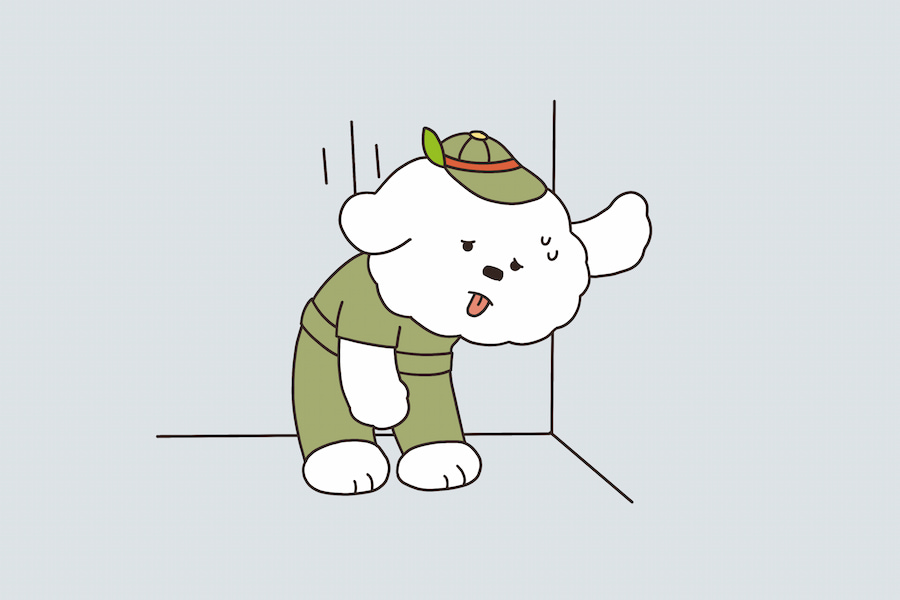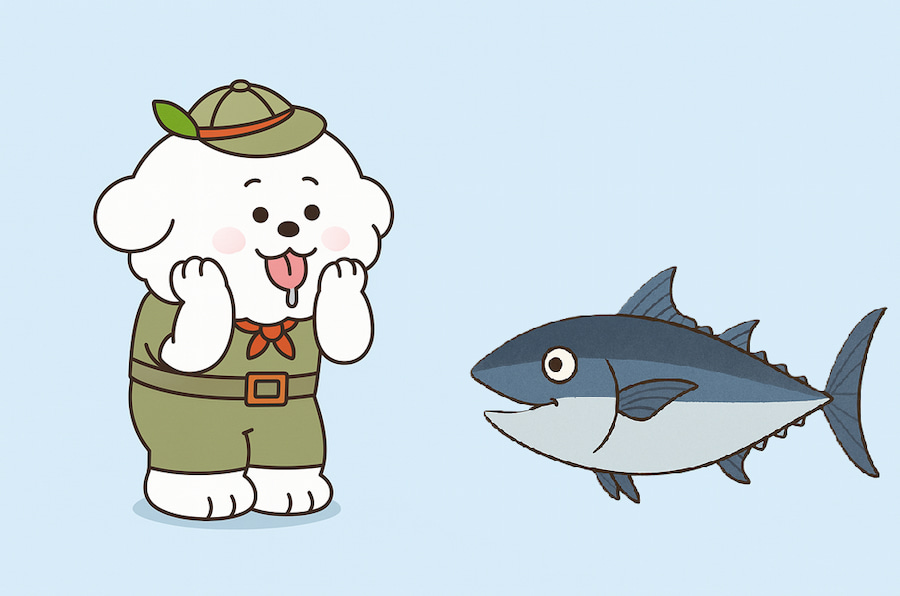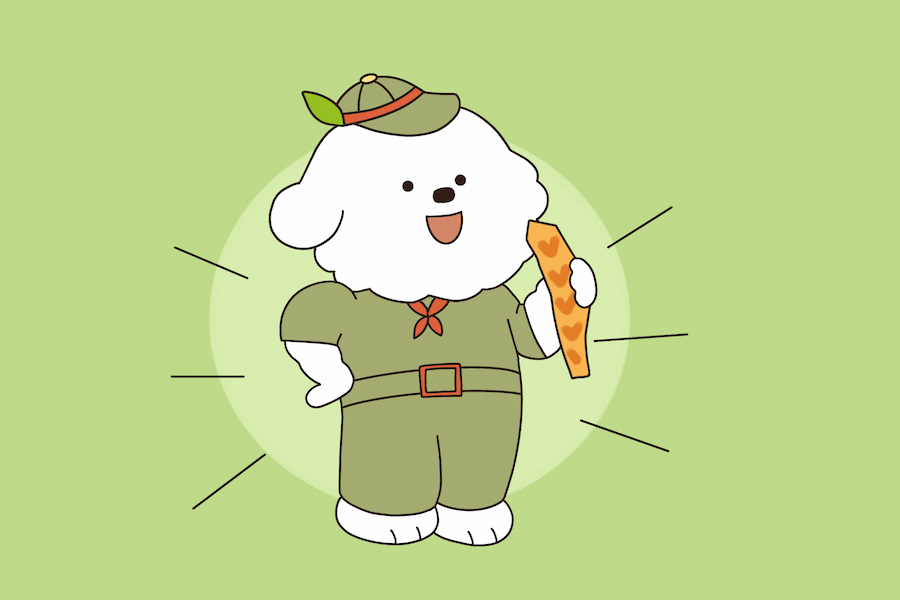We all like apples since they are an excellent and widely available fruit. Dogs appear to agree as well. Your dog might stare at you until something breaks and falls to the ground! However, according to ASPCA, specific fruits and vegetables are poisonous, and some are not good for dogs. It’s wise to double-check beforehand can dogs eat apples.
Let’s explore the pros and cons of giving apples to your dog, starting with whether they are safe.

Lee&Pol makes the best treats for your dog’s health by combining apples with protein-rich dried pollock. The salt and bones in the dried pollock are thoroughly removed for over 24 hours.
Can Dogs Eat Apples?
Fortunately, dogs can eat apples. But feed only sparingly—avoid feeding the apple core or seeds. Apple seeds are toxic as they have cyanide. Even though there isn’t much cyanide in each apple, the risk of cyanide poisoning is too great. Before giving your dog apple slices, remove the seeds and core.
Can Dogs Eat Apple Skin?
Yes, dogs are allowed to eat apple skin. Dogs may benefit from apple peel’s high fiber, vitamin, and antioxidant content. But before giving your dog an apple, make sure you give it a good wash to get rid of any chemicals or pesticides.

Some dogs might have trouble breaking down apple skin, so keep an eye out for any indications of stomach problems in your pet.
Can Dogs Eat Green Apples?
Dogs can eat green apples, but only in moderation. Some dogs may find green apples less appetizing than sweeter types due to their tart taste. They are nutrient-dense and offer fiber, antioxidants, and vitamins A and C. Before giving them to your dog, take out the seeds and core because they contain potentially dangerous cyanogenic chemicals.
Can Dogs Eat Freeze Dried Apples?
Freeze dried apples are a deliciously crunchy and nutrient-dense treat for your pet. Real apples that have undergone a special drying process to remove moisture while maintaining the fruit’s vibrant flavor and nutrients are used to make these all-natural treats.
In contrast to a lot of commercial dog treats, freeze-dried apples are pure, unadulterated apples that are full of vitamins, fiber, and antioxidants. They don’t have any added sweets, artificial preservatives, or needless fillers. They are not only a delicious treat for your dog but also an excellent method to give them extra fruit in their diet.

Lee&Pol freeze-dries only pure apples without any preservatives, sugar, or artificial sweeteners!
Is Apple Good for Dogs?
There are several nutrients in apples that are good for our pets. Apples contain fiber, potassium, vitamins A and C, and antioxidants. But you should offer your dog a healthy and well-balanced diet to get all the required nutrients. And they should not need fruit as a supplement.
However, apples have a crisp texture that may assist in cleaning teeth and freshening breath. This is not the only benefit of apples for dogs.
While apples are typically considered healthy for dogs, owners should know that this excellent fruit has an unavoidable high sugar level. Thus, it’s advisable to feed apples moderately. Treats should make only 10% of your dog’s daily caloric intake. This is a standard rule to follow.
Benefits of Apple for Dogs
Apples have many health benefits as they have low fat, low calories, high moisture content, minimal carbohydrate content (including naturally occurring sugars), and a considerable quantity of fiber. It is okay to give your dog occasional access to a few slices of apple as a low-calorie, sweet, and crunchy treat. Here are some benefits of apples:
- Packed with Nutrients: Apples are an excellent way to give pets access to important nutrients. They supply enough vitamins A and C, strengthening your pet’s defenses against illness and encouraging good skin. Furthermore, apples have a high dietary fiber content, aiding proper digestion.
- Promotes Dental Health: Chewing apple slices might help your dog fight foul breath and clean teeth.
- Promotes Hydration: Because of their high water content, apples can help with increased hydration, particularly during hot weather.
- Antioxidant: Apples are also a great source of antioxidants, preventing disease and improving general health.
How Much Apple Can a Dog Eat?
Although apples are perfectly fine for your dog to eat, offering them in moderation is crucial. As a rule of thumb, one to three slices work well. Wash and slice the apple before feeding it to your dog. Your pooch will find it easier to chew if you remove any potentially harmful components, including the seeds.
Can Dogs Eat Apples Every Day?
Apples are safe for dogs to eat every day in moderation. Apples are a nutritious treat high in antioxidants, vitamins, and fiber. However, overfeeding apples can cause diarrhea and other digestive problems.
Precautions When Feeding Apples to Dogs
When it comes to treats other than dog food, apples should be consumed in moderation. Treats should not account for more than 10% of a dog’s food consumption, according to veterinary nutritionists at AAVN—veterinarians who have earned board certification in animal nutrition. This prevents nutritional imbalances resulting in weight gain, vitamin deficiencies, or chronic illnesses.
When exploring, look for wild apples or crabapples that have fallen on the ground. Dogs that eat a lot of fallen apples on the ground risk consuming cyanide-containing seeds.
Before giving your dog an apple, you should take the following measures:
- Clean the Apple: Pesticides are applied to some apples to prevent insects from eating them. Wash the apple before giving it to your dog because pesticides can harm dogs.
- Clean the stem and seeds: Besides posing a choking concern, apple stems and seeds have trace levels of the deadly cyanide toxin. Although there isn’t much cyanide in apple seeds that can cause the dog to become ill, it’s still advisable to steer clear of them.
- Cut into Chunks or Slices: Depending on your dog’s size, you may cut the apple into large or small slices. Cut the apple into small pieces for small dog breeds, such as a Chihuahua. Bigger breeds, such as Great Danes or Labrador Retrievers, may have larger pieces, but it’s preferable to err on the side of too little rather than too huge.

Lee&Pol removes all seeds and cores from apples that could be harmful to dogs, so dogs can safely enjoy the taste and nutrition of apples!
Can Dog Eat Apple Seeds?
You may have heard about cyanide in apple seeds, which is toxic to both humans and dogs. This is accurate, but it’s also true that the tiny amount often poses no danger in the seeds of a single apple.

Nevertheless, it’s crucial to be cautious and take out the seeds before giving your dog an apple because cyanide poisoning can be extremely dangerous.
Symptoms of Dog Eating Apple Seeds
In case you’re concerned that your dog may have consumed an excessive number of apples without your knowledge, be aware of the following common symptoms of cyanide poisoning:
- Dilated pupils
- Difficulty breathing
- Panting
If you see any of these symptoms, don’t hesitate to call your veterinarian so your dog can receive assistance immediately.

Can A Dog Eat an Apple Core?
Dogs can safely consume apple flesh, but the core should not be given to them. This is because apple cores contain trace amounts of cyanide in their seeds, which can harm dogs if ingested in large numbers. However, the main issue with apple cores is that they could cause gastrointestinal obstruction and choke hazards.
Apple cores can become a choking hazard for tiny breeds, due to their size and hardness. A dog’s intestines could become obstructed if they swallow the core whole or bite off big chunks, which would result in a serious medical emergency needing surgery.
To help lower the risk of choking, it’s advisable to chop the apple into manageable slices to fully benefit from the nutritional benefits of apples without any hazards.
What Happens If a Dog Eats an Apple Core?
If your dog eats apple core, then it’s critical to watch out for signs of discomfort or anxiety. Although the apple seeds within the core contain cyanide, unless a dog consumes a significant amount, the small amount is usually not enough to cause poisoning.
On the other hand, the hard, indigestible apple core is a greater risk for small dogs since it can choke or block the gastrointestinal tract. Vomiting, diarrhea, appetite loss, fatigue, and discomforts like pacing or restlessness are examples of blockage symptoms.
It’s important to contact your vet instantly if your dog exhibits any of these symptoms following an apple core ingestion. The veterinarian can provide guidance based on your dog’s size, health, and quantity of apple core consumption. Your veterinarian may advise induced vomiting if your dog has consumed apple cores. Diagnostic imaging, however, may be recommended to look for a blockage in your pet’s digestive tract if some time has passed.
Conclusion
When given in moderation, apples can provide dogs with a nutritious treat. Apple flesh contains antioxidants, fiber, and vitamins A and C. Moreover, the crunchy texture might help your dog’s teeth get cleaner. But, since the seeds may be poisonous due to trace levels of cyanide, it’s crucial to remove the core and seeds first.
Furthermore, the core itself poses a risk of choking. Watch closely for signs such as vomiting, diarrhea, or restlessness if you think your dog may have eaten apple seeds or a core. These could be signs of an obstruction or poisoning. If in doubt, give your vet a call straight away.
If you take those safety measures, your pet may enjoy a few apple slices as a treat. Ensure you don’t go overboard with treats and adhere to the 10% rule.
FAQ
Yes, given in moderation, apples are beneficial to dogs. They offer vital nutrients that maintain a healthy immune and digestive system, such as fiber, vitamins A and C, and antioxidants. Because they help to clean teeth, apples also support dental health. Nevertheless, since the seeds and core contain dangerous cyanogenic substances, always remove them and keep an eye out for any adverse reactions in your dog.
Dogs should not eat apple pie. Typically, apple pie is made with sugar, unsuitable components for dogs, and spices like nutmeg. Dogs cannot tolerate nutmeg’s toxicity, and its high sugar content can cause obesity and other health problems. To protect your dog’s health and safety, give them basic apple slices or applesauce that don’t have any sugar or spices added.
Apple juice is safe for dogs to consume in moderation, but it shouldn’t contain artificial sweeteners or added sugars, such as xylitol, which can harm dogs. Homemade, natural apple juice is the safest choice. To lower the sugar content, ensure the juice is diluted with water. To prevent any health problems, always speak with your veterinarian before adding new foods or beverages to your dog’s diet.
Applesauce is safe for dogs, but only in moderation and without additional sugars, artificial sweeteners, or preservatives. To make sure there are no dangerous ingredients, homemade or unsweetened applesauce is the best choice. For dogs, applesauce can be a delightful treat or added to their usual meal for nutritional benefits and extra flavor.
When given in moderation, apples are safe for puppies to eat. Vitamins and fiber are among the healthy components found in apples. To avoid choking, introduce apples gradually and ensure they are sliced into small, manageable pieces. The seeds and core should always be removed because they could become dangerous. Also, keep an eye out for any indications of stomach distress in your puppy.
Dogs can safely eat apples, but there are certain things to keep in mind. The seeds and core contain cyanogenic chemicals that can be hazardous in high quantities, while the flesh and skin are safe. Digestive problems such as diarrhea can also result from overfeeding apples. To ensure apples work well in your dog’s diet, introduce them gradually and consult your veterinarian.



